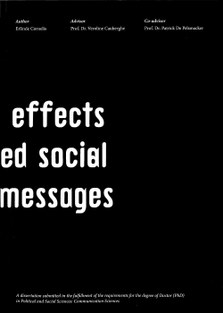Two-Sided Messages
Researcher(s): Erlinde Cornelis
Promotors: Verolien Cauberghe and Prof. dr. Patrick De Pelsmacker
Duration: October 2009 to September 2013
Description
“The effectiveness of different message strategies in health risk campaigns; the impact of the moderating influence of type of health issues and personality traits on the importance of cognitive versus affective components in one- versus two-sided messages”
The outbreak of swine flu all over the world draws our attention to the importance of health risk communication. Several health risks have been intensely communicated to the public by means of public awareness campaigns to inform the public about the risks concerning the issue on the one hand, and to reassure the receivers that behavioural change can diminish the threats. Risk communication can be defined as “communication intended to supply people with the information they need to make informed, independent judgements about risk to health, safety and the environment”(Gow & Otway, 1990). How governments and institutions responsible for the communication about these health risks should compose their messages is a very important aspect to guarantee the effectiveness of health messages. The aim of this PhD was to examine the impact of different message strategies concerning health risk issues for different types of health issues and different individuals.
